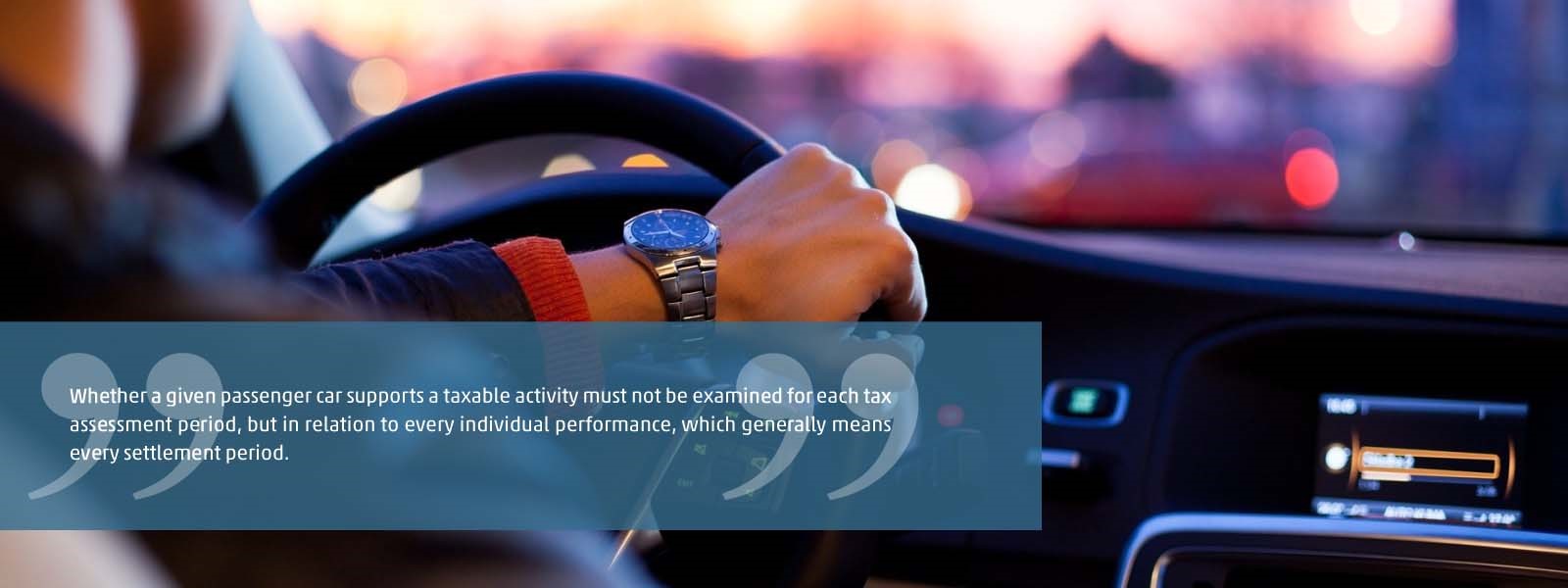An increasing number of companies provide their employees with a company car, which they can use for private purposes too, as well as for the company’s taxable business activity. So company cars are a kind of benefit that has its own tax implications. What taxation issues can arise in relation to company cars, and what should those involved watch out for? These are the questions we seek answers to in our article.
Company car tax
The very first type of tax that we think of in connection with company cars is the company car tax. Passenger cars as defined in the Act on Personal Income Tax – except for environmentally-friendly cars – are subject to company car tax. Company car tax has to be paid on passenger cars if they are not in private ownership and they are registered in Hungary, namely, they have a Hungarian licence plate. Furthermore, passenger cars that are in private ownership or which have a foreign licence plate are also liable for tax if costs are accounted on them in accordance with the Act on Accounting or the Act on Personal Income Tax. What is important from a company car tax perspective is that an owned car is treated the same way as a car used under a finance lease agreement.
If a Hungarian company owns a passenger car with a Hungarian licence plate that is a company car, or leases such a car, then company car tax has to be paid regardless whether costs are accounted on it or not. The tax obligation commences on the first day of the month following the purchase or the start of the leasing.
What many Hungarian companies do not even consider is that when they have employees on a foreign business trip or on a secondment who rent a car abroad with a foreign licence plate, and the company then accounts for certain costs in this respect, this may trigger a company car payment liability for these vehicles.
It is important to mention that in order to rule out double taxation, vehicle tax can be deducted from paid company car tax under certain circumstances.
Value added tax on company cars
Companies generally buy or lease their company cars (including open-end leasing arrangements). In recent years, the preference was increasingly to lease cars as opposed to buying them. Until the end of 2018, the reason for this trend was essentially that the leasing companies relieved companies of the extra burden involved in maintaining and running their own vehicles, in return for payment of the lease fee.
From 1 January 2019 a favourable amendment of the Act on VAT entered into force, which permits the deduction of half the input VAT on the leasing of passenger cars without having to keep records of any kind, and this also tipped the balance towards leasing arrangements, as VAT can generally not be deducted when purchasing a car.
Let’s take a closer look at what this positive change actually means. Under the previous regulation, the VAT in the lease fee for leased passenger cars used for business and private purposes could be deducted in line with the proportion of use attributable to the company’s taxable business activity. This proportion had to be substantiated with various documents – such as route records. However, the amendment that entered into force from the beginning of this year states that 50% of the lease fee may not be deducted due to the private use. In other words, half of the VAT in the lease fee is deductible. All that the companies have to do is examine whether the leasing of the passenger car supports, to any extent, the company’s business activity that entitles them to deduct the tax. If the answer is yes, then without any kind of extra records at all they can deduct 50% of the VAT on the lease fee.
If a car at a given business is used for the taxable business activity to an extent that exceeds 50%, then the company may also decide to deduct the VAT in proportion to the actual business use. In this case, however, there is still a need for route records to be kept.
Additional NAV information on analysis per transaction
It is important to note that additional information was published on the NAV’s website on 9 September, in relation to that which was previously issued on the subject. The NAV stated that whether a given passenger car supports a taxable activity must not be examined for each tax assessment period, but in relation to every individual performance, which generally means every settlement period. This is because according to the supplementary information from the NAV, taxpayers have to decide for every service used whether they are entitled to deduct tax or not, and to what extent. And services used can be analysed through performance because the tax payment liability is related to the performance.
In practice, this means that if a company leases passenger cars and agrees to settle up monthly with the leasing firm, then it must be examined monthly whether the criterion of use for a taxable business activity is fulfilled. That said, if a car is leased for a shorter period, then it must be examined within this performance period whether there was any use for business purposes. Business use can be supported with any document, even an email, which is produced during normal procedures and which verifies the use for business.
From a VAT perspective it is important to note that the value added tax on fuel and other products procured to run the passenger car generally cannot be deducted, while for services required to run or maintain the passenger car the Act on VAT does not permit the 50% deduction.
Corporate tax in relation to company cars
In accordance with the Act on Corporate Tax, business costs and expenses for a company include the costs and expenses incurred in the course of using, maintaining and running company cars. In this context, companies do not incur any corporate tax payment obligations and their tax base does not increase, regardless of whether there is any private use or not.
Personal income tax in relation to company cars
In line with Section 8.37 of Schedule 1 to the Act on Personal Income Tax, under in-kind benefits the use of a passenger car supplied by a payer, non-resident legal person or other organisation for private purposes, including the related road passes or tickets, are tax-exempt. Accordingly, the mere fact that employees also use their company cars for private purposes does not give rise to any personal income tax payment obligation, and equally tax-free are any motorway tolls paid for the company cars. It is also important to note that in the definition above, the word “use” can be understood to mean products and services that support the proper running of the passenger car.
Our article reveals that from a taxation perspective we have to pay attention to a lot of things when providing employees with company cars. Our experience shows that some companies do not handle the tax issues properly, while others do not take the opportunities associated with the favourable taxation of company cars into full account. If you have any questions on this do not hesitate to get in touch, our specialists will be happy to help you.











